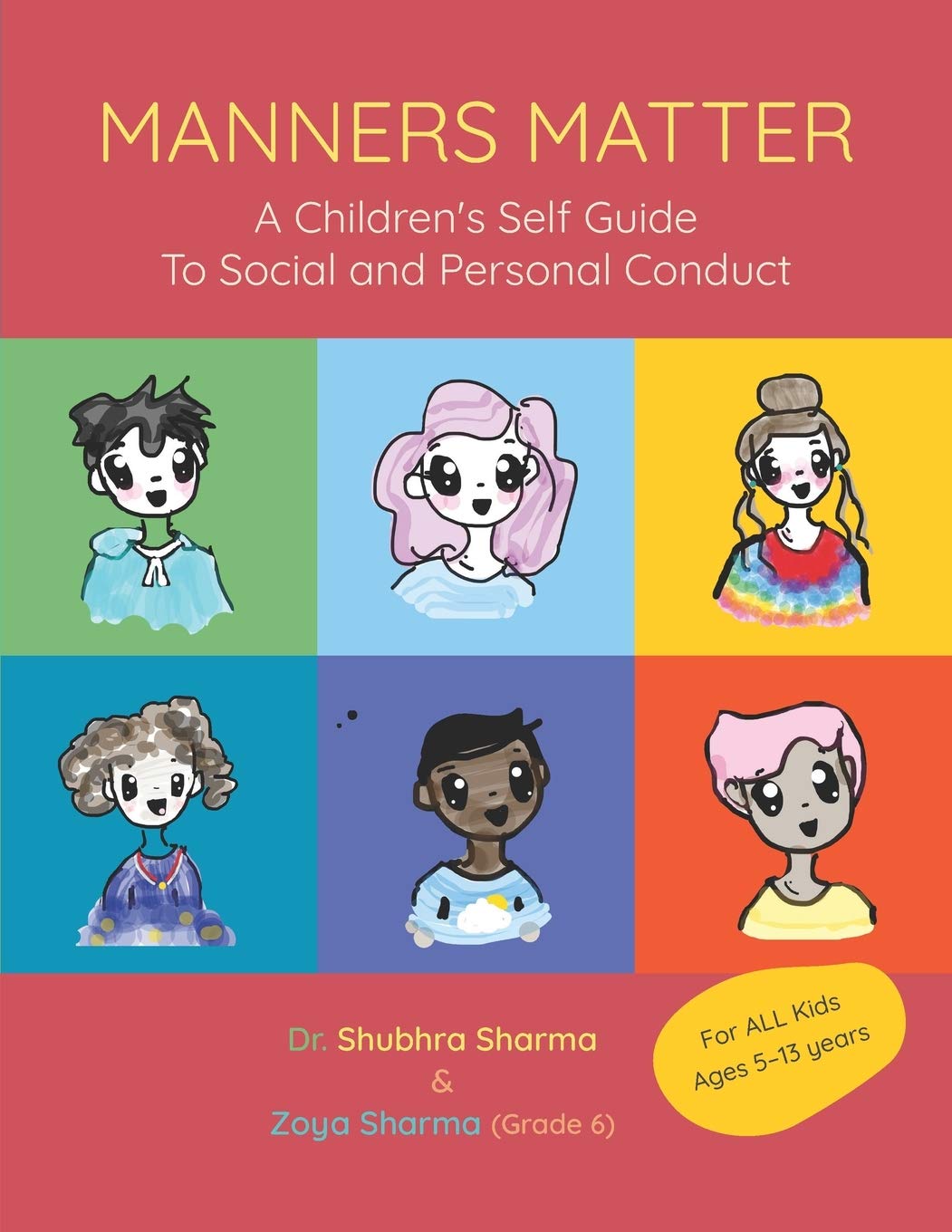 *May contain affiliate links
*May contain affiliate links
Teaching our kids proper etiquette can be a challenge at times. As parents, we are not the only influence in our children’s lives and sometimes we need additional tools to help us. One way to reinforce lessons for our children is to provide consistency of the message through media. We use songs to learn ABCs, images to learn multiplication, and books to learn much, much more. I can say from experience, nothing reinforces our potty training attempts quite like Daniel Tiger and his catchy lyrics on his show. It is most effective to use several of these media tools so you can create repetition. When people have enough exposure to something, it becomes a fact in their mind. This works as well for etiquette as it does for ABCs.
Dr. Shubhra Sharma, an anthropologist and now children’s book author, is offering one such tool in this book, Manners Matter: A Children’s Self-Guide to Social and Personal Conduct.

Dear Parents
Children understand directives. They also understand authority. When parents’ direct children to behave appropriately, they usually do because they are well aware of the consequences of not following a directive. But children resist authority every way they can. And the most powerful weapon in their arsenal is “why”—why should I do this? Why should I sit straight? Why do I need to use a fork like this? Why can’t I throw food I don’t want to eat? And so on. Nothing tests a parent’s patience as a “why.” It just keeps coming till it becomes a full-fledged interrogation. Consequently, emotions get frayed, exhaustion takes over, and parents effectively always end the interrogation by telling their children to leave the table and/or go to their room. What permeates the home, henceforth, are feelings of guilt (for the parents), and resentment (for the children). For the children then, good behavior, following etiquette, is not a choice but an imperative. They must sit straight at the dinner table because a parent said so and not because good posture assists in good digestion.
So, they learn good behavior as a negative rather than as a positive with a good physiological reason behind it. What if it was the other way around? What if there was guide to good behavior that was a book and not a parent? Would that help? I think it might. Children resist good behavior as a way to resist authority. What if good behavior was self-directed rather than parent-directed? This book is that experiment. It’s an early-stage guidebook for good behavior and etiquette for children between the ages of 5-13 years. This book, a first in a series, is about giving children the power to craft themselves into responsible familial and social citizens without authoritative parenting. So instead of a parent saying, “sit straight while you eat,” a child who’s already read the guidebook, does so without prompts. This guidebook is not about making parenting useless but collaborative, easier even. This self-guide is for your children, parents. This book gives the children tools to practice good behavior. Here are top ten manners your child can self-learn and direct:
- Thanking those who nourish you, every day. Parents don’t have to take care of you, but they do because there’s a deep abiding love here. Honor that with your gratitude.
- Eating wisely and with your mouth closed. No-one likes a full or oozing mouth. It’s never a pretty sight. Do not subject others to sights you wouldn’t want to be subjected to!
- Cleaning up after you (whether it’s the dining table or the bathroom sink). Wipe off a mat, set dirty dishes in the dishwasher, wipe off the sink after brushing. These demonstrate attentiveness and care for others. You’ll be paid forward for such micro-acts of consideration.
- Thinking of food and water as precious and not wasting it. America wastes 40% of its edible food. Don’t add to the statistic. Reduce it by considering well how you eat and how much at a time. Similarly, water is precious. Drink what you need. Avoid plastic and also recycle every time. The fish in the oceans will be grateful.
- Being the host that no-one expects but will love. Be attentive to your friends when they come over for sleep overs. Clean your room and bathroom. Ask them if they have any food allergies. Convey the same to your parents so they can offer food accordingly.
- Being a good listener and an empath, especially to friends. We all feel pain sometime or the other. We just need someone to listen without judgment. Be that someone.
- Making your bed each morning makes a Bill Gates. Making your bed may seem like an innocuous exercise. But the operative word is “organize.” Organize your brain for the day with this activity and see how productive you can be!
- Being an honorable patron at a restaurant by thanking those who serve you. Look at your server, listen to them, thank them every time they bring out your food or address your needs. Your kindness will raise every one’s vibration.
- Practicing gratitude every day because it makes life sweeter for everyone. Counting our blessings, shifts our emotions, making them positive, vital. More vital our emotions, more positive our social environment will be. That’s just the truth.
- Asking parents and teachers for help when bullied. Self-care is life-giving. Suffering is not wise. Self-preservation is essential. Seek adult help when you cannot help yourself, especially against cruelty.
Thank you, parents, for sharing this book with your children. Children are already very wise. This book only gives them words and tools to negotiate a personal and social world that sometime can be confusing and at other times treacherous. This book is their companion, a friend they might not think they want but sometimes absolutely need!
Peace.
Sincerely
Dr. Shubhra Sharma.
This book is laid out in easily digestible sections for kids and the adorable illustrations are created by the author’s own daughter, Zoya Sharma. What a fun parent-child project!
You can find Manners Matter: A Children’s Self-Guide to Social and Personal Conduct on Amazon.


